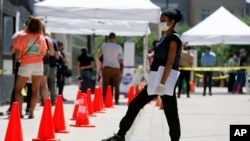The head of the World Health Organization said Monday the coronavirus pandemic is being politicized and that a lack of global leadership to fight the virus is a bigger threat than the virus itself.
"The world is in desperate need of national unity and global solidarity. The politicization of the pandemic has exacerbated it," WHO Director-General Tedros Adhanom Ghebreyesus said Monday during a videoconference for the Dubai-based World Government Summit.
“The greatest threat we face now is not the virus itself. It’s the lack of global solidarity and global leadership,” Tedros added.
Tedros did not say who he thought was politicizing the pandemic.
U.S. President Donald Trump has criticized the WHO for its response to the coronavirus outbreak, saying it acted too slowly and with too much praise for China. He has threatened to end all U.S. funding for the organization.
Tedros said Monday the world reported a jump of 183,000 new confirmed COVID-19 cases on Sunday, the largest single-day increase it has recorded since the pandemic began.
Global infections surpassed 9 million on Monday. Tedros noted that it took over three months for the world to see 1 million virus infections, but the last 1 million cases have come in just eight days.
Global cases of the virus have been surging in Brazil and India, while the United States is reporting new outbreaks.
Brazil’s health ministry said Monday the country recorded 21,432 new confirmed cases in the past 24 hours, along with 654 new deaths.
India also reported Monday a record number of cases and 400 new deaths in the past 24 hours.
More than a dozen U.S. states are seeing rising case numbers. In New York City, however, once the epicenter of the U.S. outbreak, cases have leveled off. Monday marked an opening of more businesses in the city.
In Britain, the government reported its lowest daily COVID-19 death toll since mid-March with 15 new deaths.
New Zealand announced Monday it was tightening some coronavirus restrictions as it tries to stamp out an uptick in cases, all imported, after having declared it eliminated any active cases in the country.
The measures include extending a ban on cruise ships docking in New Zealand ports and stricter conditions to be met before those who arrive from overseas can leave quarantine.
New Zealand has reported nine new cases, including two more Monday, all of whom are currently in isolation facilities.
South Korea, which has been dealing with its own increase mainly in the Seoul area in recent weeks, reported 17 new cases Monday, the smallest rise in nearly a month.
The Africa Centers for Disease Control and Prevention says that across the content, the number of confirmed cases has passed the 300,000 mark. South Africa has the most with more than 101,000.
In Pakistan, authorities allowed some trade with neighboring Afghanistan to restart Monday. Trucks carrying fruits, vegetables and other goods were able to cross the Ghulam Khan border.
Saudi Arabia said this year’s pilgrimage to Islam's holy sites, including Mecca, will not be canceled but only "very limited numbers” of people will be allowed at the sites.
In Japan, there was good news for sports fans. The heads of the country’s professional baseball and football leagues said Monday that beginning June 10, games can be played with up to 5,000 fans in attendance. People will be required to wear masks and avoid shouting.








